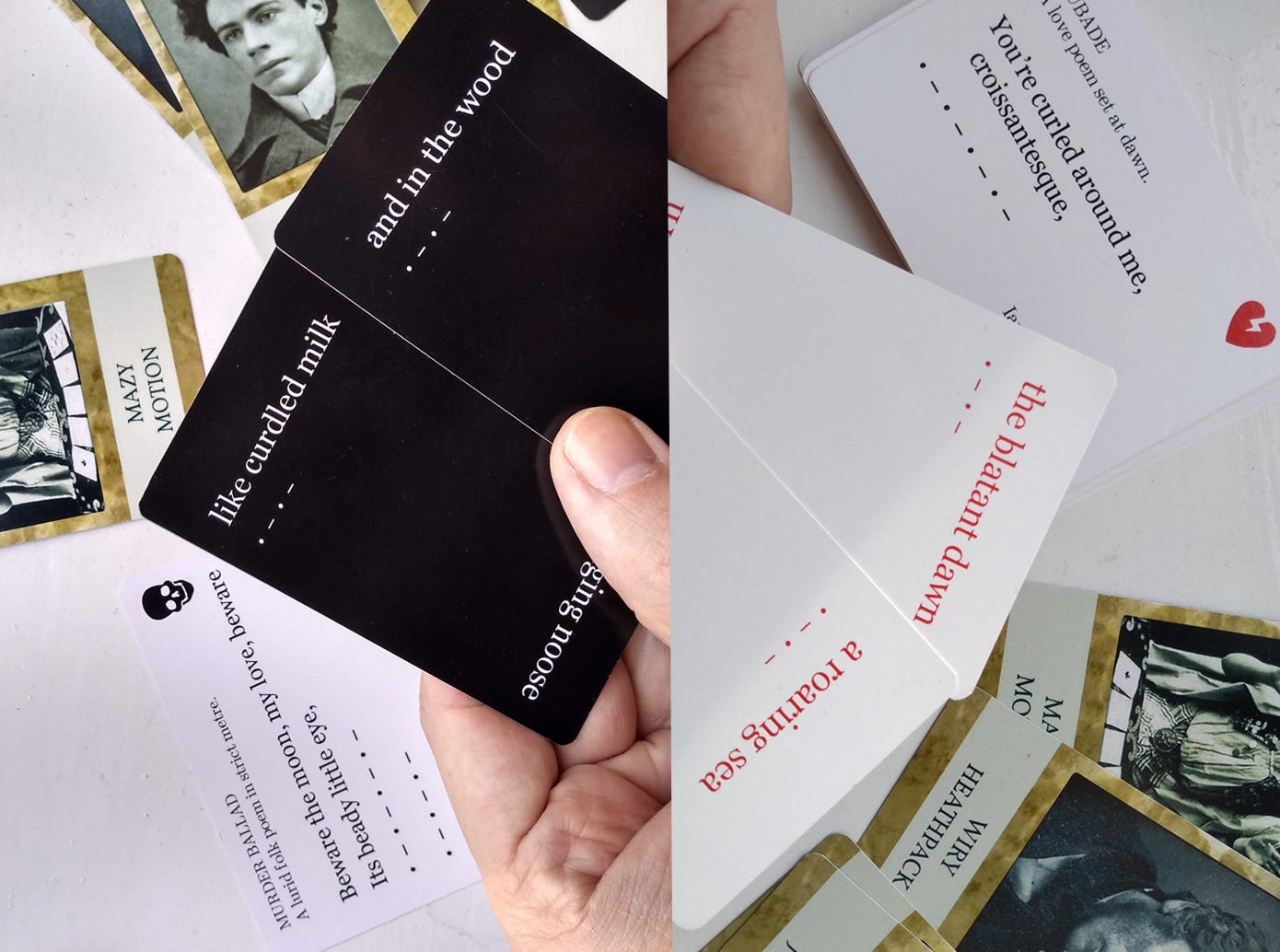A round-up of news for October / early November:
‘Playing Poetry’ Exhibition
The Playing Poetry exhibition at the National Poetry Library runs until January 15th. It’s been curated, hooked up and debugged by my friend Nick Murray — no simple feat, since it includes a mixture of digital poetry games displayed in mini arcade cabinets alongside card decks and other object poems.
I have two pieces exhibited. The first is Erratum, which is a work-in-progress — a kind of stealth jigsaw game in which you play a rat at a terrible party, making his/her own speech out of the spilt fragments of others’ murmurs. I’m still working on updates to help it play more smoothly.
The second is Adversary, a prototype poetry card game I made with Abigail Parry, in which players compete to complete couplets and quatrains in the most satisfying way. This got a brief mention in The Financial Times at the start of the month.
I read some new interactive and labyrinth poems at the launch event for the exhibition on 20th October, and revamped an earlier article on ludokinetic literature to bring it up to date.
“Now that kind of talk is everywhere”
I wrote a very short essay in response to a longer one. It’s called ‘End of a Fantasy: The Panic Behind Literary Reactionism’. It’s about why people get rowdy about the idea that there is some sort of ideology and political leaning behind all expressive works, and it starts like this:
“[Contemporary] fiction is about society,” says Clare Pollard, in a short essay asking how writers can respond to the present moment. I wouldn’t have thought this statement at all controversial, but somehow it prompted a fierce rebuttal from A. Natasha Joukovsky on ‘literary moralism’ and “the Rampant Conflation of Fiction and History”, full of much more dubious statements. Social reform is distracting novelists, Joukovsky says, from their aesthetic responsibility to beauty. Fiction and history are ‘discrete’ – never the twain shall meet. The success of Margaret Atwood’s The Handmaid’s Tale has nothing to do with its politics, but is due to it being “stylishly written”. While Pollard’s essay is addressed to people for whom writing and reading are ways of negotiating the world, Joukovsky’s is squarely aimed at those who consider themselves capital ‘w’ Writers – members of a sacred order – and so rounds off with a list of commandments, in the form of a hodgepodge of aphorisms that have little to do with the preceding argument.
At first I found all of this merely haughty, its passion misplaced. Once I started to look at the parts that were being quoted admiringly on social media, however, I began to recognise the animating concern behind the essay’s proclamations.
Maskplay
We launched the second two titles in the Sidekick Books Hipflask Series, Look Again: A Book of Hidden Messages and You Again: A Book of Love-Hate Stories, last Sunday as a part of The Glue Factory, David Collard’s weekly online literary cabaret — which is sadly coming to a close at the end of this year. The format allowed us to display some of the pages from the books on screen while they were being read — somewhat essential for those pieces in Look Again which yield hidden lines when looked at in a certain way. The ‘Stereoscopic Masks’ series, for example, works just the same as a stereogram or magic eye; by adjusting one’s focus until the the two columns merge into a single central one, an illusion of depth is created so that some of the words stand out:
Hallowe’en
Finally, having missed out on making costumes and carving pumpkins for Hallowe’en for several years, I decided to knock up some poem posters. Kirsty’s ‘On Being the Night’ was originally written for Future Karaoke #1: Creatures, the first poetry night I put together and compered since moving to Cambridge. The others are from a sequence I wrote for, and published in, Battalion — micro-portrait poems collaged from Charles Darwin’s The Different Forms of Flowers ... and T. W. Reid’s Cabinet Portraits: Sketches of Statesmen.






